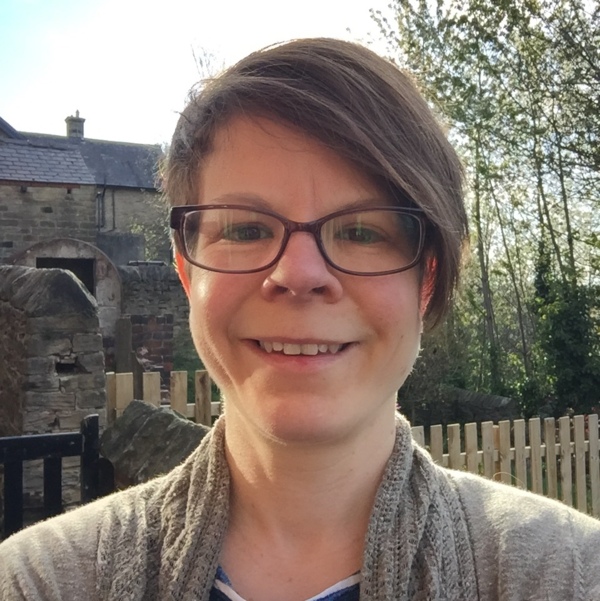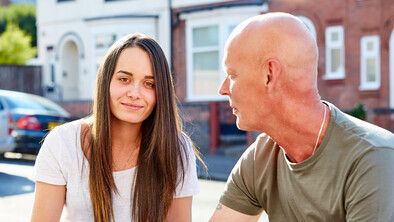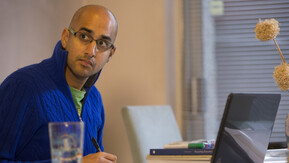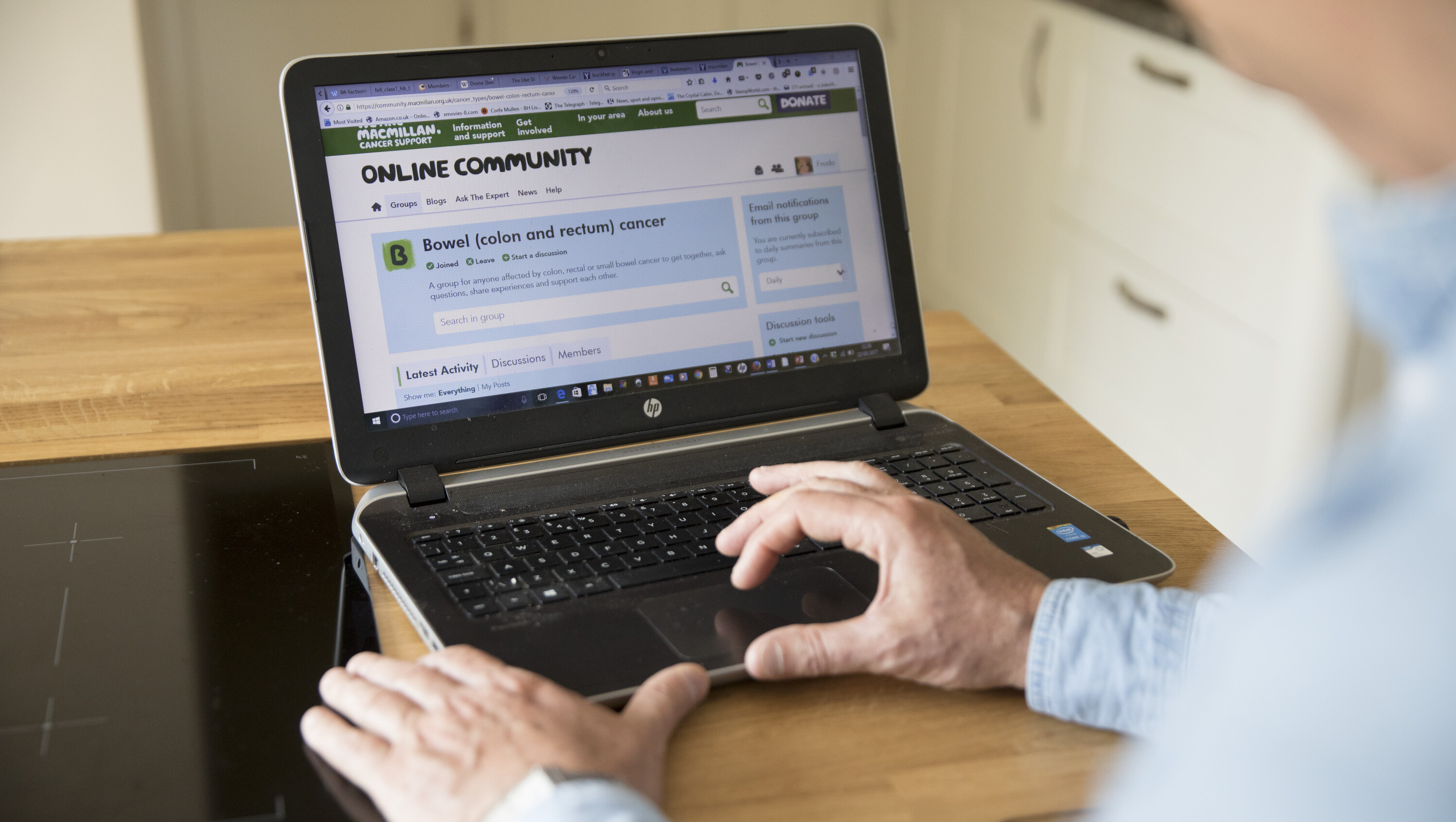How the Rainbow Project Is helping to change cancer care for LGBTQIA+ people
Introducing the Rainbow Project
LGBTQIA+ people affected by cancer often face unique barriers when accessing care. In this conversation, Ros speaks with Joe Henson, Manager of the Rainbow Project’s Cancer Champions programme in Northern Ireland, about why inclusive support matters, how misinformation and inequity affect health outcomes, and how the project is helping change conversations.
How do you support LGBTQIA+ people affected by cancer?
The project is here to help challenge myths and provide inclusive support throughout someone’s cancer journey. We focus on emotional, mental and physical wellbeing and try to make sure people feel safe, seen and supported.
For example, our deputy director shared with us as part of our digital screening campaign that her GP notes wrongly stated that she didn’t need a smear test because she’s a lesbian. That led to her having her first screening eight years later than she should have.
Stories like that show why this work is essential to give people up to date reliable information not based on word of mouth. We also support healthcare professionals to feel more confident having certain conversations. Sometimes, it’s not a lack of care, it’s fear of getting it wrong.
What kind of barriers do LGBTQIA+ people often face when it comes to cancer care?
The challenges are wide-ranging. Screening uptake is much lower. Around 18% of lesbian and bisexual women miss screenings, compared to 7% of the general population. Trans and non-binary people may be excluded entirely due to gender marker issues.
There are emotional barriers too. If someone’s had a negative healthcare experience, and many LGBTQIA+ people have, that stays with you. Healthcare spaces are often gendered, and if you're non-binary or trans, you may worry about how you're perceived.
On top of that, in Northern Ireland, our cancer outcomes are already the worst in the UK. Without the Equality Act or hate crime legislation LGBTQIA+ people are facing discrimination without the same legal protections. With all this combined, you can see the real necessity for a service like ours.
It sounds like the issues go beyond cancer care itself. Can you say more about that?
It’s not just about cancer, but everything that surrounds it.
LGBTQIA+ people are at a higher risk for 7 different cancers due to a variety of barriers in the system and social factors. Sometimes people require 3 or more additional appointments to receive the same diagnosis compared to cisgender, heterosexual peers according ot NHS reports.
Read more about Overcoming barriers: equitable cancer care for the LGBTQIA+ community.
If you’ve lived through rejection or trauma, those things affect your health long before cancer comes into the picture.
It can be as specific as things like if you're transitioning and you are accessing gender affirming care and you don’t know how your chemotherapy or radiotherapy is going to impact that treatment. We want to make sure everyone has the best resources they can.
What support do you offer through Cancer Champions?
- 1-to-1 support and listening-ear services,
- Peer groups and inclusive screening materials
- Events and resources, including a trans and non-binary chest screening video we developed with Antrim Area Hospital and the Public Health Agency. It walks people through the process in a really affirming, practical way.
We also create space for conversations about palliative care and end-of-life planning. For LGBTQIA+ people, there can be added layers. Someone might be out to only parts of their family, which can complicate funeral decisions. Others may not know where to find an LGBTQIA+ friendly funeral director, or how to think about things like their digital legacy and how they want to be remembered.
Our LGBTQIA+ Death Cafés have been powerful. These are spaces where people can talk openly about grief, dying, and legacy in ways that reflect their identity. It’s deeply personal, and for many, it’s the first time they’ve felt able to have those conversations without judgment. It helps people realise they’re not alone.
You mentioned managing cancer myths, is that a big part of the project?
Cancer myths are a big focus. One of our Cancer Champion officers, Samantha, has designed this lovely true-or-false resource. It has 9 statements about LGBTQIA+ people and cancer, and you have to review which you think are true and which you think are false. It takes five minutes but even if someone remembers just one fact, it might change how they approach their health.
We’ve had people surprised to learn, for example, that there’s a specialist service called UCATs for trans people accessing cancer and gender-affirming care. People just don’t know these things exist.How has working with Macmillan helped the project grow?
We wouldn’t be here without Macmillan. This is a three-year pilot with Macmillan and all our staff are trained as Macmillan Professionals. Their support, networks and guidance have been incredible. It’s helped us embed LGBTQIA+ inclusion across more cancer services and work directly with health professionals who want to improve.
What kind of feedback have you had from people using the service?
People often say they wish this had existed earlier, that they would have felt less alone. We’ve had people tell us they opened up to us before telling family or friends. That trust means a lot. In our Death Cafés, we've had people who have wanted to stay in touch outside of the group.
We've had some great training feedback from professionals, saying this has been useful.
For someone newly diagnosed, living with cancer or supporting a loved one, what would you want them to hear first?
That it’s okay to feel nervous. You don’t have to go through this alone. You can call us, email us, drop by a stall, or even message us on social media, whatever feels easier.
We've tried to put our faces on things. So, if you're worried about who you're talking to, you can go on the web.
You can bring someone with you. Our team is made up of people I’d trust to talk to if I were feeling vulnerable. We’re here to listen, not judge. And if we’re not the right service for you, we’ll help you find one that is.
That's the ethos we have in the Rainbow Project, as we support each other as well as the people coming to our services.
And finally, how can people get involved?
We love volunteers, so please get in touch if you are interested in getting involved.
The Rainbow Project
- Hate crime advocacy
- Co-cultural counselling Gay Ethnic Group (GEG)
- Supporting minority ethnic communities
- Asylum seekers and refugees
- Rainbow Youth
- Sexual health services and testing.
Information to help you whatever you're going through
How Macmillan can help
LGBTQIA+ forum on the Online Community
Our Online Community is a safe space where you can share experiences, ask questions and chat anonymously to others affected by cancer. There are forums for different cancer types and experiences including a dedicated LGBTQIA+ forum.
Macmillan Support Line
Our Macmillan Support Line nurses and advisers are here to answer your questions about cancer and the impact it can have on work, money, relationships and how you're feeling. Call us for free on 0808 800 00 00 from landlines and mobiles within the UK, lines open 8am - 8pm. You can also chat with us online.
Psychological Care Programme in Northern Ireland
Macmillan is supporting a new Psychological Care Programme in Northern Ireland. It is for people affected by cancer whose mental health is also impacted. The service is also available to family members and those close to the person with cancer. Family is who you decide it is and includes those people who are important to you.
Macmillan centres in Northern Ireland
We have local services across Northern Ireland where you can get cancer information and support and help with money and benefits.
About our information
This information has been written, revised and edited by Macmillan's Digital Content Editor team and checked by Macmillan's Cancer Information Development team.
Learn more about our Digital Content Editors and how we produce our cancer information.
About the author

Ros Ayres
Read more
-
Blogs 06 Nov 2023You might not describe yourself as a carer. But looking after someone with cancer can have an impact on your life. There is support and information available that can help.
-
Blogs 07 Feb 2024Get expert information and advice from Macmillan about work rights, financial support options, sick pay and self-employment for people with cancer.
-
Blogs 06 Jun 2023Steph tells us more about her role as an Online Community Officer and shares why the Online Community team are passionate about supporting people affected by cancer.






